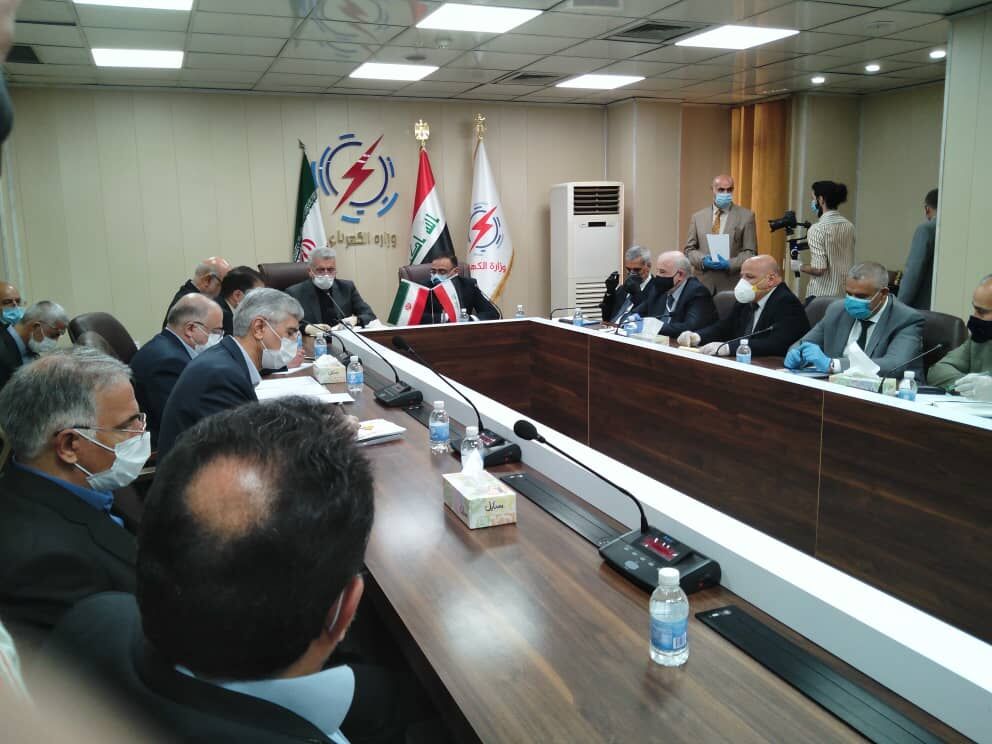The Iraqi electricity minister has noted the importance of electricity imports from neighboring Iran, describing it as vital.
In a meeting with his Iranian counterpart Energy Minister Reza Ardakanian in Baghdad on June 3, Iraq’s Minister of Electricity Majid Mahdi Hantoush appreciated Iran's export of 1200 MW electricity, adding that “Iraq has put on the agenda of the electricity ministry paying disbursement of importing electricity from Iran."
Hantoush hoped that the volume of imports will not decrease in summer, according to the Iranian state news agency IRNA.
For his turn, the Iranian minister said that about one and a half year ago Iran and Iraq signed an agreement to improve the electricity industry of Iraq. “Despite problems in supplying gas for power plants, Iran made efforts for fulfilling Iraq's demands,” Ardakanian added.
The two sides also discussed synchronizing electricity grids, establishing cooperation in education, and developing power grids.
Tehran is one of the main suppliers of electricity in the Arab country. Iranian electricity and gas imports comprise around 30-40 percent of Iraq’s power supply. Iraq imports 1.2 gigawatts (GW) of Iranian electricity into its power grid and takes around 1.5 billion cubic feet per day of Iranian gas through pipelines in the south and east to feed power stations.
Iran is providing the Iraqi side with developing and overhauling their power plants and electricity grid while improving the Arab country’s electricity grid management system, according to a memorandum of understanding (MOU) for cooperation in the energy sector signed in December 2018.
Meanwhile, despite the imports, Iraq has been unable to meet its electricity needs, because of undeveloped gas reserves, flaring of associated gas and an aging and debilitated power sector that suffered extensive damage from Islamic State attacks and needs upgrades of transmission and distribution networks.
On June 1, Iranian ambassador to Iraq Iraj Masjedi and Iraqi new Finance Minister Ali Abdul Ameer Allawi discussed various ways to bolster bilateral economic ties.
Allawi expressed gratitude for invitation from his Iranian counterpart and he expressed hope that he would pay a visit to the Islamic Republic of Iran in the near future at the head of a trade and economic delegation.
In recent years, economic relations between Iran and Iraq have expanded, along with the volume of bilateral trade. Bazargan, Shalamcheh and Mehran border points have recently opened between the countries, after months of closure because of the coronavirus outbreak.
Although the border points were closed, Iran provided the necessary goods of Iraq through sea trade as well as Parviz Khan Border Point in Iraqi Kurdistan. Before the COVID-19 outbreak, 300-400 trucks entered Iraq through Shalamcheh Border Point.
Iran is planning to export its natural gas to the Kurdistan region of Iraq. The authorities in the Iraqi Kurdistan Region have submitted several requests for the start of gas supply from Iran to the bordering regions.
Iran is exporting 32 million cubic meters (mcm) of natural gas to Iraq on a daily basis. Iraq inked a deal in late 2017 to import gas from Iran to the eastern border province of Diyala, increasing purchases of the Iranian fuel, which started in June that year after several years of delay. As per the deal, Iran committed itself to export gas to the Iraqi capital Baghdad and the southern Iraqi city of Basra.







 Russian peacekeeping forces, deployed in the Karabakh (Garabagh) region of Azerbaijan since 2020, have commenced their withdrawal from the area.
Russian peacekeeping forces, deployed in the Karabakh (Garabagh) region of Azerbaijan since 2020, have commenced their withdrawal from the area.
 The number of evacuees from flooded areas in Kazakhstan has reached 97,852 people, including about 32,856 children since March 27.
The number of evacuees from flooded areas in Kazakhstan has reached 97,852 people, including about 32,856 children since March 27.
 The Islamic holy month of fasting, Ramadan comes to an end this week with the celebration of a joyous festival called Eid (meaning “festival” in Ar...
The Islamic holy month of fasting, Ramadan comes to an end this week with the celebration of a joyous festival called Eid (meaning “festival” in Ar...
 Azerbaijan officially unveiled the logo for the upcoming 29th session of the Conference of the Parties to the United Nations Framework Convention o...
Azerbaijan officially unveiled the logo for the upcoming 29th session of the Conference of the Parties to the United Nations Framework Convention o...



